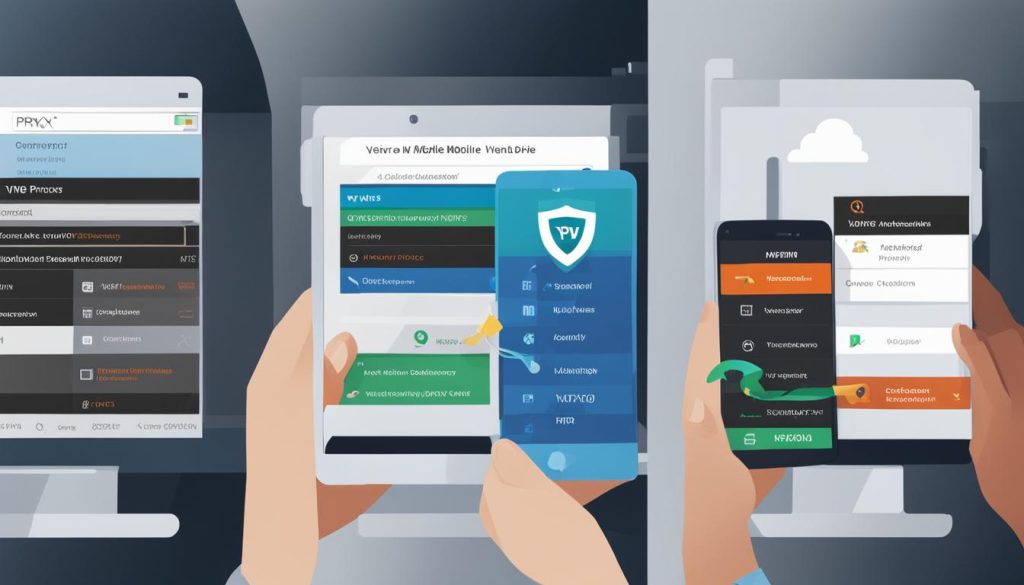Welcome to our comprehensive comparison guide where we will explore the differences between mobile proxies and VPNs. Both solutions offer secure browsing, online privacy, and IP address masking, but they differ in their functionalities and effectiveness. By understanding the unique features of mobile proxies and VPNs, you can make an informed decision on which solution is best suited for your needs.
Before we dive into the details, let’s first understand what mobile proxies and VPNs are and how they work.
What are Mobile Proxies?
Mobile proxies are proxy servers that use mobile IP addresses to mask the user’s original IP address. They act as intermediaries between the user and the internet, rerouting internet traffic through the proxy server and encrypting the data. Mobile proxies are known for their ability to provide secure browsing, online privacy, and data encryption.
What are VPNs?
VPNs, or Virtual Private Networks, create encrypted and secure connections between the user’s device and the internet. By connecting to a VPN server, the user’s internet traffic is routed through the server, masking their IP address and encrypting their data. VPNs offer internet anonymity, secure browsing, and online privacy, making them ideal for bypassing geo-restrictions and protecting sensitive data.
Choosing the Right Solution
Now that you understand the basics of mobile proxies and VPNs, it’s time to consider which solution is right for you. Factors such as your specific needs, desired level of security, and compatibility with devices and services should be taken into account when making a decision.
Key Takeaways:
- Mobile proxies and VPNs provide secure browsing, online privacy, and IP address masking.
- Mobile proxies use mobile IP addresses to hide the user’s original IP address.
- VPNs create encrypted connections between the user’s device and the internet.
- Consider your specific needs and desired level of security when choosing between mobile proxies and VPNs.
- Compatibility with devices and services should also be taken into account.
Now that we’ve covered the basics, let’s dive deeper into the functionalities, security features, and advantages and disadvantages of mobile proxies and VPNs. Stay tuned for the upcoming sections!
What are Mobile Proxies?
Mobile proxies are proxy servers that utilize mobile IP addresses to mask the user’s original IP address. These proxies act as intermediaries between the user and the internet, rerouting the user’s internet traffic through the proxy server and encrypting the data. Mobile proxies are known for providing secure browsing and online privacy by hiding the user’s real IP address and encrypting their data.
They are commonly used in applications such as web scraping, content automation, and ad verification. Mobile proxies offer a unique advantage as they use IP addresses assigned to mobile devices, making them less likely to be detected and blocked by websites or online services. This allows users to maintain anonymity and avoid IP bans while accessing restricted content or conducting automated tasks.
With the increasing need for secure browsing and online privacy, mobile proxies have gained popularity among individuals and businesses. By masking the user’s IP address and encrypting their data, mobile proxies ensure that their online activities remain private and protected from prying eyes.
| Advantages | Disadvantages |
|---|---|
| 1. Enhanced online privacy | 1. Limited availability |
| 2. Secure browsing | 2. Costly compared to other proxy solutions |
| 3. Compatibility with various devices | 3. Connection speed may be slower |
| 4. Effective for web scraping and automation | 4. Requires technical setup and configuration |
What are VPNs?
VPNs, or Virtual Private Networks, are services that create an encrypted and secure connection between the user’s device and the internet. When connected to a VPN, the user’s internet traffic is routed through a VPN server, which masks their IP address and encrypts their data. VPNs provide internet anonymity, secure browsing, and online privacy by preventing others from tracking the user’s online activities. They are widely used to bypass geo-restrictions, protect sensitive data, and ensure online security on public Wi-Fi networks.
VPNs offer a range of features that make them an ideal solution for individuals and businesses looking to enhance their online security and privacy. By encrypting the user’s data, VPNs prevent unauthorized access and protect sensitive information from hackers and cybercriminals. Additionally, VPNs allow users to access geo-restricted content by masking their IP address and making it appear as if they are browsing from a different location.
With VPNs, users can also enjoy the benefits of internet anonymity. By masking their IP address, VPNs prevent websites, advertisers, and government agencies from tracking their online activities. This added layer of privacy ensures that users can browse the internet without being targeted with personalized ads or having their data collected without consent.
In summary, VPNs provide a secure and private browsing experience by encrypting data, masking IP addresses, and offering internet anonymity. They are a valuable tool for individuals and businesses that prioritize online security and privacy.
Choosing the Right Solution
When it comes to secure browsing and online privacy, choosing between mobile proxies and VPNs can be a daunting task. Both solutions offer IP address masking, data encryption, and internet anonymity, but they differ in various aspects. To make an informed decision, consider the following factors:
1. Security Features
Mobile proxies and VPNs employ different security measures to protect your online activities. Mobile proxies provide IP address masking, which ensures that your real IP address remains hidden. Additionally, they encrypt your data, making it harder for hackers to intercept. However, VPNs offer more advanced encryption protocols, providing an extra layer of security. VPNs also route your entire internet traffic through their servers, enhancing your online privacy even further.
2. Compatibility
Consider the devices and services you use regularly. Mobile proxies are often compatible with mobile devices, making them ideal for activities like web scraping and ad verification on smartphones and tablets. On the other hand, VPNs can be used on a wider range of devices, including laptops, desktops, and routers. Additionally, VPNs can unlock geo-restricted content and allow access to region-specific websites and streaming platforms.
3. Speed and Performance
Another crucial factor to consider is the speed and performance of the chosen solution. Mobile proxies typically offer faster connection speeds since they route traffic through mobile IP addresses. This can be advantageous for tasks that require quick response times. However, VPNs may experience slightly slower speeds due to the encryption process, but they generally provide stable and reliable connections.
By carefully evaluating these factors, you can make an informed decision on whether mobile proxies or VPNs are the right solution for your secure browsing and online privacy needs. Remember to weigh the advantages and limitations of each option to ensure the best fit for your specific requirements.
FAQ
What are the main differences between mobile proxies and VPNs?
Mobile proxies utilize mobile IP addresses to mask the user’s original IP address, while VPNs create an encrypted and secure connection between the user’s device and the internet. Mobile proxies are commonly used for web scraping, content automation, and ad verification, while VPNs are widely used to bypass geo-restrictions, protect sensitive data, and ensure online security on public Wi-Fi networks.
How do mobile proxies and VPNs provide secure browsing and online privacy?
Mobile proxies hide the user’s real IP address and encrypt their data, while VPNs mask the user’s IP address and encrypt their data by routing their internet traffic through a VPN server. Both solutions protect the user’s online activities and prevent others from tracking them.
Which solution is better for secure browsing and online privacy?
The choice between mobile proxies and VPNs depends on your specific needs. If you require secure browsing for tasks such as web scraping or content automation, mobile proxies may be more suitable. If you need to bypass geo-restrictions, protect sensitive data, or ensure online security on public Wi-Fi networks, a VPN may be the better option.
Can mobile proxies and VPNs be used on all devices and services?
Mobile proxies and VPNs are compatible with various devices and services. However, it is important to check for compatibility before choosing a specific solution.
Are mobile proxies and VPNs effective in providing secure browsing and online privacy?
Both mobile proxies and VPNs are effective in providing secure browsing and online privacy. However, their effectiveness may vary depending on factors such as the quality of the service and the user’s specific requirements.
What are the advantages and disadvantages of mobile proxies and VPNs?
Mobile proxies offer IP address masking, secure browsing, and online privacy for specific tasks like web scraping. However, they may have limitations in terms of compatibility and overall performance. VPNs offer a wider range of benefits, including bypassing geo-restrictions and ensuring online security on public Wi-Fi networks. However, they may be more resource-intensive and may slow down internet speeds.

